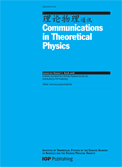
COMMUNICATIONS IN THEORETICAL PHYSICS
Scope & Guideline
Connecting scholars through groundbreaking physics research.
Introduction
Aims and Scopes
- Quantum Mechanics and Quantum Information:
Research exploring the foundations of quantum mechanics, quantum entanglement, quantum computing, and information theory, including studies on quantum algorithms and protocols. - Gravitational Physics and Cosmology:
Investigations into the nature of gravity, black holes, and cosmological models, with a focus on theoretical frameworks that explain phenomena such as dark matter and dark energy. - Mathematical Physics:
Development and application of mathematical techniques to solve complex problems in physics, including integrable systems, soliton theory, and differential equations. - Statistical Mechanics and Thermodynamics:
Studies addressing the statistical properties of physical systems and their thermodynamic behaviors, including phase transitions and critical phenomena. - Plasma Physics and Nonlinear Dynamics:
Research on the behavior of plasmas, nonlinear wave phenomena, and their applications in various fields, including astrophysics and condensed matter physics. - Field Theory and Particle Physics:
Theoretical explorations of particle interactions, field theories, and their implications for our understanding of fundamental forces and particles.
Trending and Emerging
- Quantum Technologies:
A surge in research focused on quantum technologies, including quantum computing, quantum cryptography, and quantum sensors, indicating a growing interest in practical applications of quantum theory. - Complex Systems and Nonlinear Dynamics:
An increase in studies dealing with complex systems, including nonlinear dynamics, chaos theory, and their applications in various physical contexts, showcasing the evolving understanding of system interactions. - Gravitational Wave Physics:
Research related to gravitational waves and their implications for astrophysics and cosmology has gained momentum, especially following significant observational advancements. - Machine Learning in Theoretical Physics:
The application of machine learning techniques to solve complex problems in theoretical physics is emerging as a prominent theme, indicating the integration of computational methods with traditional theoretical approaches. - Quantum Gravity and String Theory:
A renewed focus on theories of quantum gravity, including string theory and loop quantum gravity, suggests a persistent interest in reconciling general relativity with quantum mechanics.
Declining or Waning
- Classical Mechanics:
While classical mechanics remains foundational, its direct applications in published research have decreased, possibly due to the growing focus on quantum and relativistic phenomena. - Conventional Electrodynamics:
Research specifically centered on classical electrodynamics has become less frequent as interest shifts towards quantum electrodynamics and its implications. - Static Models in Nuclear Physics:
Static models that do not incorporate dynamic interactions or modern computational methods are appearing less often, as researchers seek more comprehensive and dynamic frameworks. - Non-relativistic Quantum Mechanics:
Studies focused solely on non-relativistic quantum mechanics are waning, as contemporary research increasingly integrates relativistic effects and quantum field theories. - Simplistic Models of Dark Matter:
Basic models attempting to explain dark matter without considering complex interactions or new physics are being phased out in favor of more sophisticated and multi-faceted approaches.
Similar Journals
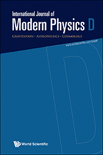
INTERNATIONAL JOURNAL OF MODERN PHYSICS D
Advancing the Frontiers of Physics and AstronomyWelcome to the INTERNATIONAL JOURNAL OF MODERN PHYSICS D, a premier publication dedicated to the advancement of knowledge in the fields of Astronomy and Astrophysics, Mathematical Physics, and Space and Planetary Science. Published by WORLD SCIENTIFIC PUBL CO PTE LTD in Singapore, the journal boasts an impressive impact, being ranked Q2 in Astronomy and Astrophysics and Mathematical Physics, and Q3 in Space and Planetary Science. With a converged publishing timeline from 1996 to 2024, this journal provides a vital platform for researchers and professionals to disseminate their findings, engage with cutting-edge research, and explore emerging ideas in modern physics. Although it operates under a traditional access model, the rigorous peer-reviewed process ensures that only the highest quality research contributes to the collective understanding of our universe. Join us in advancing the frontiers of physics and astronomy!
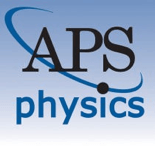
PHYSICAL REVIEW A
Pioneering Research in Molecular DynamicsPHYSICAL REVIEW A, published by the American Physical Society, is a leading journal in the field of Atomic and Molecular Physics and Optics, boasting a Q1 category ranking in its area for 2023. With an ISSN of 2469-9926 and an E-ISSN of 2469-9934, this journal plays a pivotal role in disseminating high-quality research findings, theories, and methodologies that shape current understanding and advancements in the discipline. Although not an open-access journal, it remains highly accessible to professionals and academia through institutional subscriptions. The journal's impactful contributions are evident from its Scopus rank of #70 out of 224 in the field, placing it in the 68th percentile for scholarly impact. As a hub of innovative research and a vital resource for both students and seasoned researchers alike, PHYSICAL REVIEW A remains essential for those seeking to stay abreast of breakthroughs in atomic and molecular studies, as well as optics and photonics.
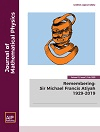
JOURNAL OF MATHEMATICAL PHYSICS
Pioneering research in statistical and nonlinear physics.Welcome to the JOURNAL OF MATHEMATICAL PHYSICS, a distinguished publication dedicated to the burgeoning fields of mathematical physics and statistical and nonlinear physics, published by AIP Publishing. Established in 1960, the journal continually showcases cutting-edge research and theoretical advancements that drive the understanding of complex systems and mathematical formulations within physics. With an impressive Scopus ranking of #38 in Mathematical Physics and #39 in Statistical and Nonlinear Physics, the journal is recognized for its vital contributions to the academic community, achieving a solid Q2 quartile ranking in both categories for 2023. While not an open-access journal, it remains a critical resource for researchers, professionals, and graduate students seeking insights into rigorous mathematical methods and their applications in physical sciences. Engage with the finest research as we converge toward new frontiers from 1960 to 2024, fostering academic collaboration and innovation.

Physics
Connecting Scholars: Where Physics Meets InnovationPhysics, published by MDPI, is an open-access journal that commenced in 2019 and has quickly established itself as a significant contributor to the field of physics and astronomy. With a respectable impact factor and categorized in the Q2 quartile for 2023, this journal serves a broad spectrum of topics within the discipline, fostering innovative research and insights. As part of the MDPI portfolio, known for promoting high-quality, peer-reviewed research, Physics aims to provide a platform for scholars, professionals, and students to publish their findings and engage with contemporary debates in the field. The journal's accessibility, paired with its commitment to scientific excellence, ensures that research is readily available to a global audience, which is crucial for advancing knowledge and collaboration in physics. Located in the heart of Switzerland at ST ALBAN-ANLAGE 66, CH-4052 BASEL, the journal enjoys a position at the nexus of cutting-edge research and academia.
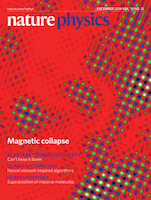
Nature Physics
Championing Excellence in Physics Research and CollaborationNature Physics is a premier journal dedicated to publishing high-impact research in the realm of physics, brought to you by the esteemed NATURE PORTFOLIO. With its ISSN 1745-2473 and E-ISSN 1745-2481, this journal has established itself as a vital resource for the physics community, enjoying a remarkable Q1 quartile ranking in the Physics and Astronomy category for 2023 and securing an impressive Rank #5/243 and a 98th percentile ranking in Scopus. Since its inception in 2005, Nature Physics has become a catalyst for innovation, featuring cutting-edge research that encompasses a broad spectrum of physics disciplines. Although it operates under traditional subscription models, it maintains a commitment to accessibility through selective publications and editorial excellence. Positioned in Berlin, Germany, this journal is a must-read for researchers, professionals, and students who seek to stay at the forefront of advancements in physics.
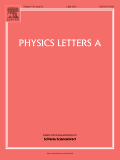
PHYSICS LETTERS A
Illuminating Discoveries in Physics and AstronomyPhysics Letters A is a renowned scientific journal published by Elsevier, dedicated to the field of physics and astronomy. Established in 1963, it has continuously evolved, offering a platform for the swift dissemination of significant research findings in various branches of physics. As of 2023, it holds a commendable Q2 ranking in the category of Physics and Astronomy (miscellaneous) and ranks 69th out of 243 journals in the same domain according to Scopus, positioning itself in the 71st percentile of academic impact. With its comprehensive scope, Physics Letters A provides a vital resource for researchers, professionals, and students, facilitating academic discourse and advancing knowledge across the field. Although it does not currently offer Open Access options, its rigorous peer-review process ensures high-quality content. It is centrally located in Amsterdam, Netherlands, and continues to be an essential outlet for innovative contributions to the physics community through the year 2024 and beyond.

PHYSICAL REVIEW LETTERS
Highlighting the Essence of Physics InnovationPhysical Review Letters, published by the American Physical Society, is a premier journal in the field of Physics and Astronomy renowned for its rapid dissemination of high-impact research findings. With a distinguished history dating back to 1958 and an impressive ranking of #13 out of 243 in the general physics category, it stands proudly within the Q1 quartile, placing it in the top 6% of journals in its field. The journal focuses on brief reports of significant fundamental research across all areas of physics, making it an essential resource for researchers, professionals, and students seeking to stay at the forefront of developments in their field. Although Physical Review Letters does not offer open access options, its rigorous peer-review process ensures a high standard of quality and relevance in its published articles. With an unwavering commitment to advancing the understanding of physical science, this journal is indispensable for those looking to make a genuine impact in their research endeavors.

ANNALES HENRI POINCARE
Shaping the Future of Physics with Peer-Reviewed ExcellenceANNALES HENRI POINCARE is a prestigious journal published by Springer International Publishing AG, dedicated to advancing research in the fields of Mathematical Physics, Nuclear and High Energy Physics, and Statistical and Nonlinear Physics. With an impressive Q1 ranking in its respective categories as of 2023, this journal is recognized as a vital resource for academic researchers, professionals, and students engaged in frontier studies of theoretical and applied physics. The journal's commitment to high-quality peer-reviewed articles promotes significant contributions to the understanding of complex physical phenomena, making it essential reading for anyone seeking to stay abreast of developments in these dynamic fields. Additionally, ANNALES HENRI POINCARE offers open access options to enhance the visibility and accessibility of groundbreaking research, underscoring its role in fostering collaborative scientific inquiry and innovation. Since its inception in 2000, it has continually provided a platform for scholars worldwide to disseminate their findings and engage with the broader scientific community, thus establishing itself as a cornerstone of academic literature.
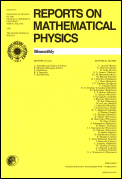
REPORTS ON MATHEMATICAL PHYSICS
Bridging Theories: Where Math Meets PhysicsREPORTS ON MATHEMATICAL PHYSICS is a distinguished journal published by PERGAMON-ELSEVIER SCIENCE LTD, focusing on the intricate interplay between mathematics and physics. Established in the United Kingdom, this journal has been contributing to the academic community since its inception, publishing significant research findings that explore the theoretical underpinnings of physical phenomena. With an ISSN of 0034-4877 and an E-ISSN of 1879-0674, the journal maintains a consistent publishing history, converging research from 1970 to 2024. It is currently ranked Q3 in both Mathematical Physics and Statistical and Nonlinear Physics categories, reflecting its commitment to maintaining a high standard of scholarly work. Although it lacks Open Access options, its targeted audience of researchers, professionals, and students will find invaluable insights into advanced mathematical methods, statistical applications, and innovative approaches in physics. With its esteemed reputation and critical role in the field, REPORTS ON MATHEMATICAL PHYSICS continues to be an essential resource for those seeking to deepen their understanding of mathematical applications in physical systems.
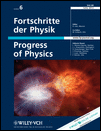
FORTSCHRITTE DER PHYSIK-PROGRESS OF PHYSICS
Advancing the Frontiers of Physics ResearchFORTSCHRITTE DER PHYSIK-PROGRESS OF PHYSICS, published by WILEY-V C H VERLAG GMBH, is a prestigious academic journal esteemed within the field of physics. With a history spanning over seven decades since its inception in 1953 and a converged publication up until 2024, this journal has established itself as a leading source for groundbreaking research and developments across diverse domains in physics and astronomy. Holding an influential Q1 ranking in the 2023 category of Physics and Astronomy (miscellaneous), it serves as an essential platform for disseminating high-quality research findings and theoretical advancements. Although not an Open Access publication, FORTSCHRITTE DER PHYSIK provides access to critical insights and scholarly discussions that are pivotal for researchers, professionals, and students alike. The journal is committed to contributing to the evolution of knowledge in physics, supporting the academic community through rigorous peer-reviewed articles, reviews, and innovative studies.